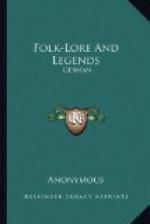“So much,” cried Sir James, “for the vaunt of a Gascon!”
Similar in every respect to the fate of Cailon, was that of Sir Ralph Neville. He, too, on hearing the great fame of Douglas’s prowess, from some of Gallon’s fugitive soldiers, openly boasted that he would fight with the Scottish Knight, if he would come and show his banner before Berwick. Sir James heard the boast and rejoiced in it. He marched to that town, and caused his men to ravage the country in front of the battlements, and burn the villages. Neville left Berwick with a strong body of men; and, stationing himself on a high ground, waited till the rest of the Scots should disperse to plunder; but Douglas called in his detachment and attacked the knight. After a desperate conflict, in which many were slain, Douglas, as was his custom, succeeded in bringing the leader to a personal encounter, and the skill of the Scottish knight was again successful. Neville was slain, and his men utterly discomfited.
Having retired one night to his tent to take some rest after so much pain and toil, Sir James Douglas was surprised by the reappearance of the old woman whom he had seen at Linthaughlee.
“This is the feast o’ St. James,” said she, as she approached him. “I said I would see ye again this nicht, an’ I’m as guid’s my word. Hae ye returned the arrows I left wi’ ye to the English wha sent them to the hearts o’ my sons?”
“No,” replied Sir James. “I told ye I did not fight with the bow. Wherefore do ye importune me thus?”
“Give me back the arrows then,” said the woman.
Sir James went to bring the quiver in which he had placed them. On taking them out, he was surprised to find that they were all broken through the middle.
“How has this happened?” said he. “I put these arrows in this quiver entire, and now they are broken.”
“The weird is fulfilled!” cried the old woman, laughing eldrichly, and clapping her hands. “That broken shaft cam’ frae a soldier o’ Richmont’s; that frae ane o’ Cailon’s, and that frae ane o’ Neville’s. They are a’ dead, an’ I am revenged!”
The old woman then departed, scattering, as she went, the broken fragments of the arrows on the floor of the tent.




